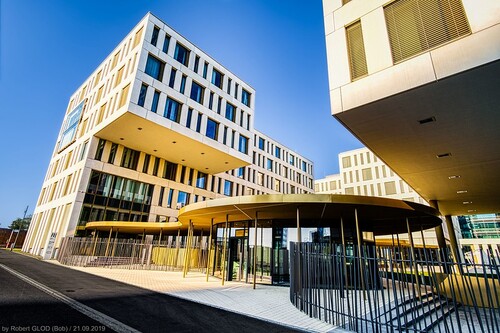La lutte contre le changement climatique, un secteur prioritaire
Suite aux dégâts provoqués par la crise du Covid-19, la BEI est intervenue autant en Afrique du Nord qu’en Afrique subsaharienne, et à parts égales entre le secteur public et le secteur privé. Les secteurs prioritaires sont clairement identifiés :
- la lutte contre le changement climatique,
- l’environnement,
- la santé.
L’adaptation au changement climatique est présente dans deux tiers des projets financés.
Dans le secteur de la santé, la Banque européenne d’investissement et la Commission européenne ont notamment investi un milliard d’euros pour créer un environnement favorable à la fabrication locale de vaccins en Afrique et lever les obstacles tant du côté de l’offre que de la demande.
Parmi les autres investissements réalisés par la BEI, 150 millions d’euros vont servir à soutenir « SheInvest », une nouvelle initiative visant à encourager l’égalité entre les sexes et l’autonomisation économique des femmes en Afrique.
Ainsi, alors qu’elle doit également faire face aux conséquences de la crise sanitaire, la BEI continue de financer la cohésion, le développement et l’action en faveur du climat. Le financement de projets de développement au-delà de l’UE a dépassé les 10 milliards d’euros, avec des flux records à destination de l’Afrique.
La BEI multiplie les partenariats internationaux
La Banque européenne d’investissement consacre de nombreuses ressources à la création de partenariats afin d’améliorer sa réactivité dans le cadre de ses opérations. Ces liens lui permettent d’assurer une synergie entre ses prêts et les instruments budgétaires d’aide de l’Union à travers plusieurs initiatives telles que JASPERS ou InnovFin. Ils ont également pour objectif de répondre aux attentes de la société civile en assurant la transparence des opérations de la BEI et en fournissant des informations à leur sujet.
En 2020, la BEI a par exemple signé un partenariat avec l’Organisation mondiale de la santé (OMS) pour renforcer l’aide d’urgence apportée à dix pays africains. La Banque a aussi renouvelé son accord de partenariat avec la PNUD, le Programme des Nations Unies pour le Développement, dans l’objectif d’intensifier ses appuis à des pays confrontés à des situations d’urgence dues à des épidémies, des catastrophes naturelles ou d’autres facteurs de fragilisation. Il y a 5 ans, les deux institutions avaient déjà conclu un protocole d’accord leur permettant de relever les défis mondiaux et d’échanger leurs connaissances dans des domaines tels que la migration, les changements climatiques et la réaction aux crises. Depuis, celles-ci ont collaboré sur un certain nombre de projets parmi lesquels la réhabilitation et la reconstruction d’infrastructures essentielles, la gestion intégrée des frontières ou bien la rénovation de bâtiments publics.
